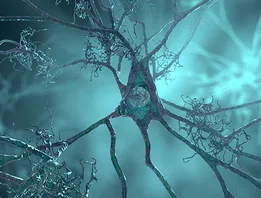


clinical research
Connecting
The Link
Researchers have discovered a bidirectional link between chronic sinusitis, anxiety and depression.

Symptoms of chronic sinusitis—the sneezing, congestion, nasal drip and ear pain—are all bothersome enough, but is it possible these annoyances are contributing to mental health issues such as anxiety and depression?

Omar G. Ahmed, MD
While previously understudied, the correlation between these specific mental health symptoms chronic rhinosinusitis (CRS) patients, Omar G. Ahmed, MD, Assistant Professor of Otolaryngology, and his team set out to determine if there was a bidirectional risk of anxiety and depression for patients with CRS. This is the first study of its kind to look at the bidirectional relationship between these conditions. Ahmed and Mas Takashima, MD, FACS, Sylvia and James E. Norton Distinguished New Century Chair and Professor of Otolaryngology, took a closer look at the role of mental health in chronic sinusitis.
VIDEO
To gain a better understanding of the correlation, the team examined a portion of the U.S. population who were diagnosed with either anxiety or depression and compared those findings to those who also developed chronic sinusitis. They discovered a bidirectional relationship—patients who were diagnosed with chronic sinusitis were at an increased risk of developing anxiety or depression.
“It’s been established that there is an impairment in their overall quality of life,” said Ahmed. “However, we wanted to examine further to learn what happens if they have mental health issues.”
Ahmed added, “Very little has ever been published in this space. What we’ve found is that once patients have been diagnosed with anxiety or diagnosed with depression, they have a two- or three-fold increased risk of development of chronic sinusitis. What's the potential mechanism? We don't know. However, we think this potential mechanism is related to perhaps an altered immune system or increased inflammation, which has been associated with mental health issues.”
“The idea for this research is to raise the awareness of these conditions to primary care physicians and clinicians,” said Ahmed.
The idea behind this research is to raise awareness of these conditions to primary care physicians and clinicians.
Omar G. Ahmed, MD
Assistant Professor of Otolaryngology
Najm S. Khan, MBS; Meher Gajula, MS; Lexi Goehring, BS; Masayoshi Takashima, MD; Aatin Dhanda, MD; Tariq A. Syed, MS; Edward D. McCoul, MD, MPH; Jeffrey T. Vrabec, MD; Murugappan Ramanathan Jr, MD; Renjie Hu, PhD; Omar G. Ahmed, MD
Erin Graham
January 2025
Related Articles







